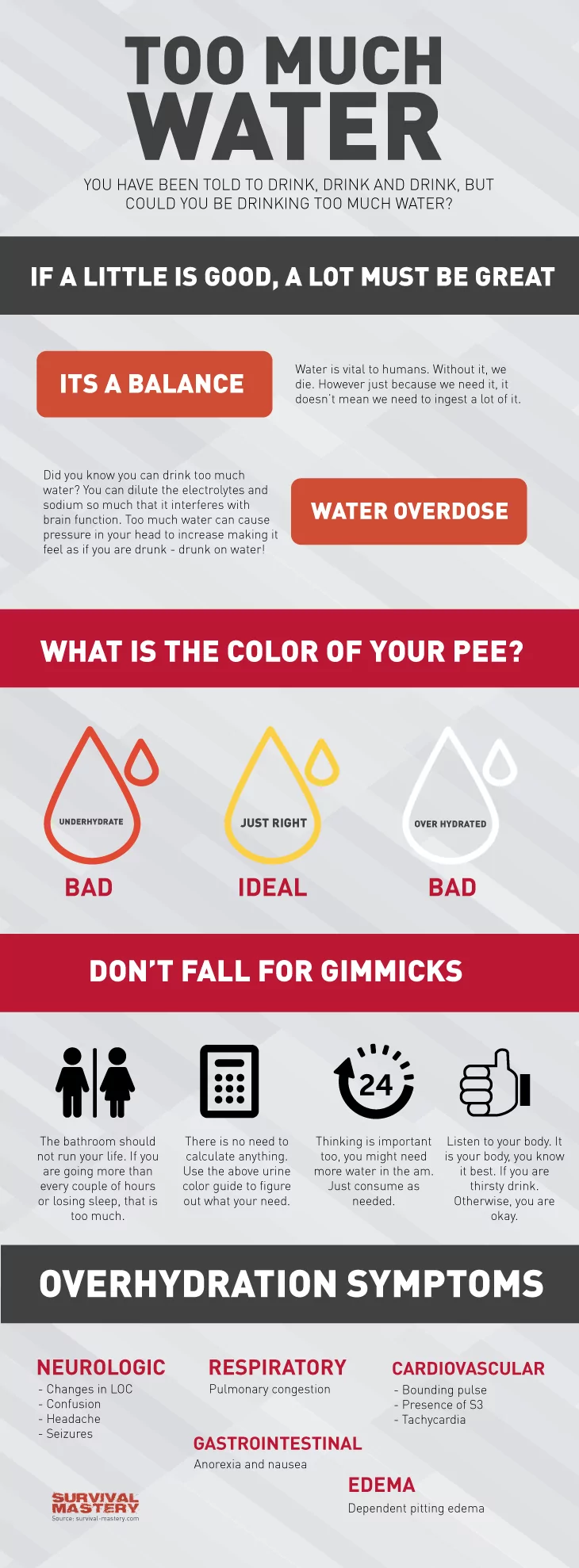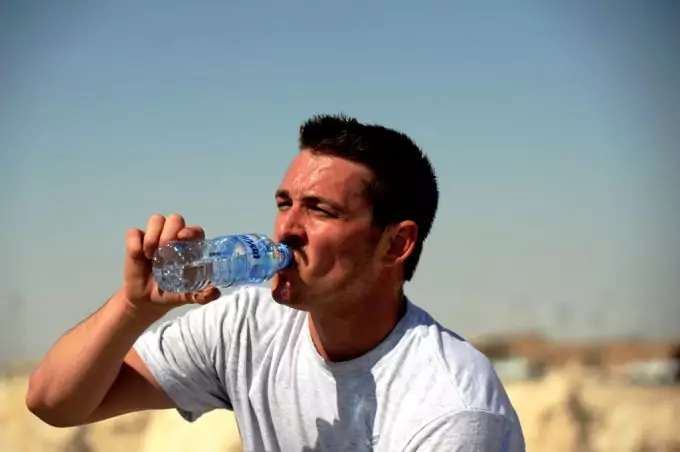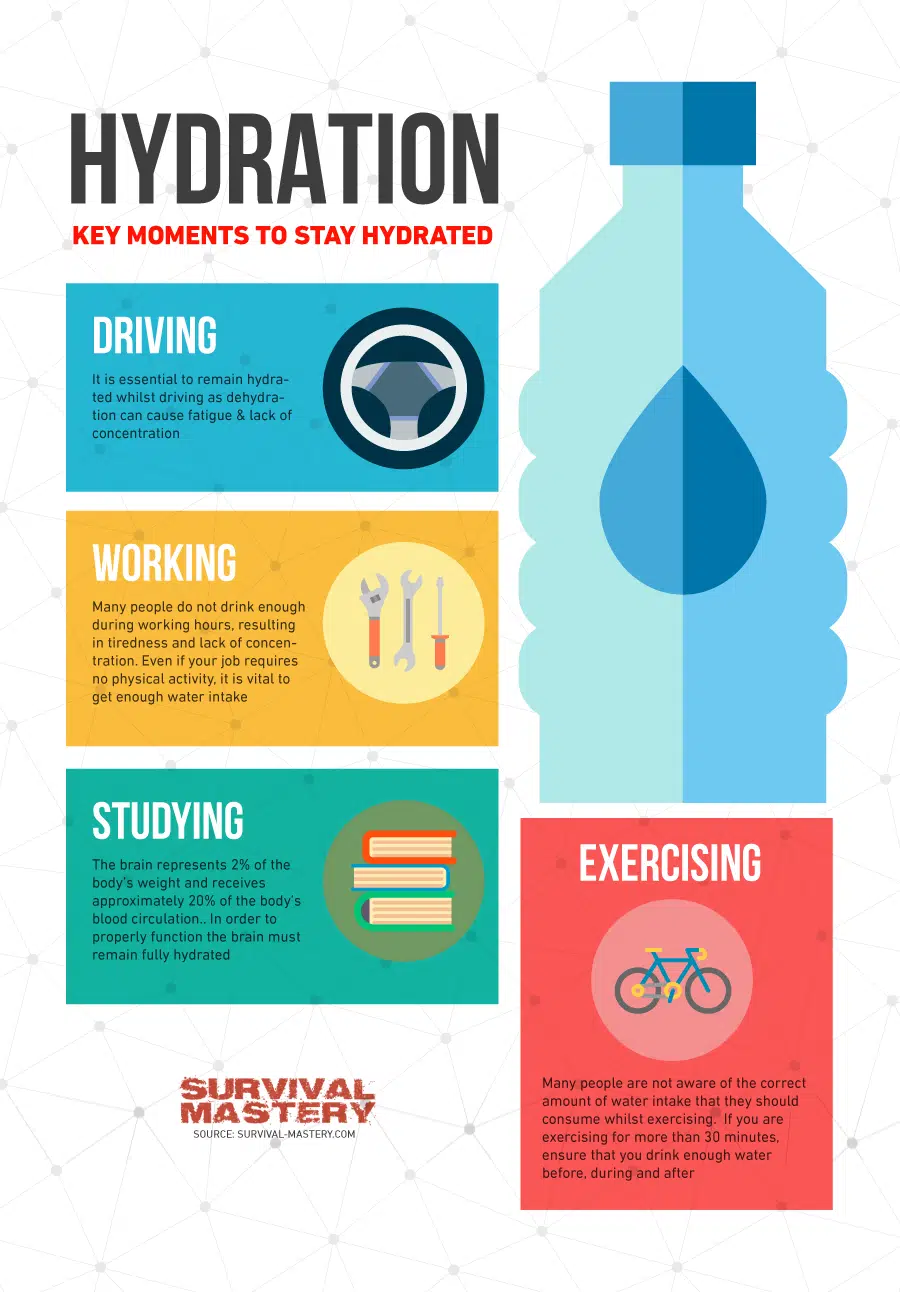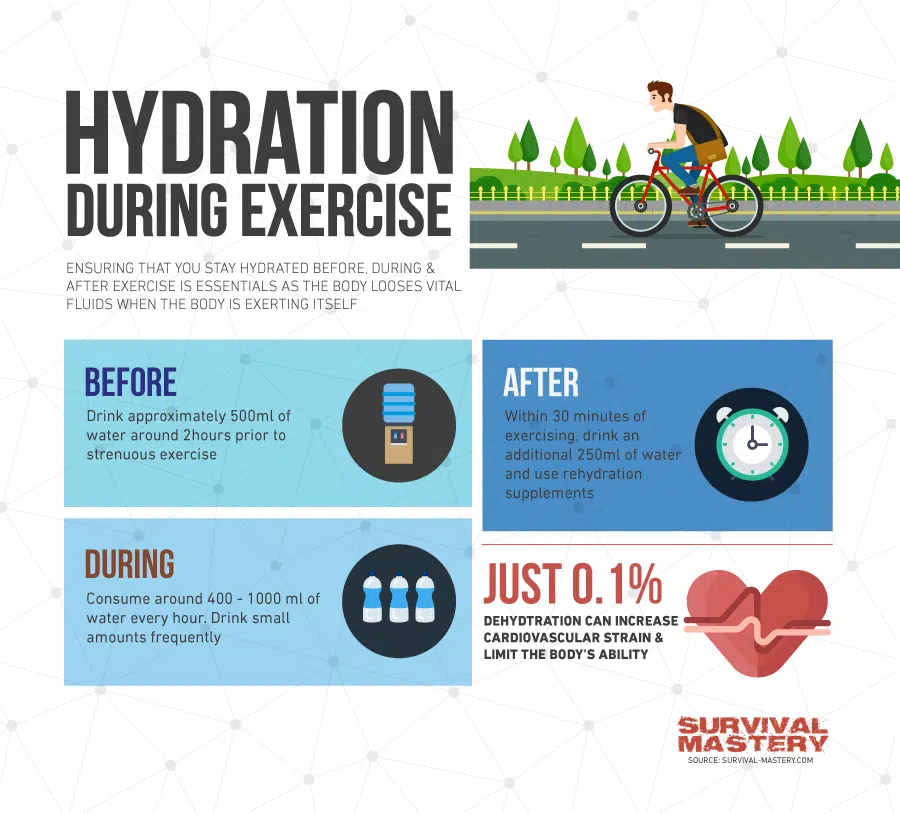We are so often advised to drink water that we rarely ask ourselves if we need to drink that much. If you’re a healthy individual, and drinking about 8 cups a day, you can’t be dehydrated, unless you’re trekking through a desert for 10 hours without a break. We all know that water is vital to the health and all the bodily functions. If we’re dehydrated we feel sluggish, tired, and our body has difficulties getting rid of toxins and waste products. So naturally it’s easy to overlook the problems occurring with overhydration, since people hardly believe this is possible.
[the_ad_placement id=”in-text-1-type-r”]You must not underestimate the consequences of overhydration (drinking too much water), as it will throw off balance all the functions in the body. The main concern is that the balance between the water and sodium content in the blood stream is very delicate. If you’re drinking too much water the sodium content in the blood will get diluted since the ratio between water and sodium will be far more in favor of the water.
See also: Water Poisoning: How to Detect Hyponatremia + Treatments List
This condition, in which the sodium content is too low per liter of blood, is called hyponatremia. Sodium is an electrolyte, which regulates how much water content is present in each cell. There is another type of hyponatremia in which the cells actually retain too much water. If you imagine that each cell in your body needs certain amount of sodium for it to function properly, this would mean that for this amount of sodium to be achieved, more water will have to drawn and retained in the cell during hyponatremia.
So, to be sure you avoid overhydration, you have to know the symptoms and signs of this condition. You can thus control much better your water intake.
Usually those people who are at risk of overhydration are athletes, participants in long marathons and such. They tend to consume much more water, which is then retained in the cells, but they lose more sodium ions through perspiration, thus diluting the remaining sodium in the blood stream, leading to hyponatremia.

Other people affected by this condition are people with kidney problems, so that the kidneys can’t properly flush the water out of the body. Thus water accumulates fast in the cells and leads to water intoxication. This syndrome is called syndrome of inappropriate anti-diuretic hormone. Older people may also have problems flushing water efficiently, so age is also a factor.
List of overhydration symptoms
- Headaches
- Confusion
- Vomiting/Nausea
- Fatigue
- Rapid breathing
- Loss of appetite
- Irritability/restlessness
- Seizures
- Muscle cramps
- Loss of consciousness and coma
In the beginning, a person suffering from hyponatremia will exhibit the first listed symptoms. They will feel confused, dizzy and have a light headache, which will become more severe unless some counter-measures are taken. The affected person will feel nauseated and will begin vomiting. It is easy to overlook these symptoms as they are very similar to the flu symptoms. As the condition progresses, the person will start to feel disoriented and other cognitive and mental changes will take place.

The more serious and severe symptoms, which will come further along with the condition are muscle cramps and general muscle weakness, painful spasms, leading to seizures and even the more serious loss of consciousness and coma. Often some people experience extreme swelling of limbs (mostly the legs) and their lungs fill with fluid. This happens due to excess blood volume.
Often the change in behavior is accompanied by shouting, irrational behavior, delirium and loss of attention. Some patients even report blurry vision and paralysis (due to muscle cramps) of one of their body. Often they may breathe rapidly, which leads to overall weakness and fatigue. In rare situations the blood pressure may be higher than normal, which may also be a helpful indication for overhydration.
Effects of overhydration
The effects of water intoxication are closely linked to the symptoms. Here is a short list of these effects:
- Digestion issues
- Changes is brain function
- Mood and energy fluctuation
- Acidosis
Digestion issues
The effect of overhydration on the stomach is that it fills too much with fluids, as it prepares to digest food. Sometimes it may wrongly assume there is food present for digestion and the person starts to feel nauseated and will vomit now and then. Due to the stomach being full of liquid/water the individual may even lose appetite. After all if you feel nauseated you definitely don’t have any appetite.
Since the body isn’t capable of handling too much liquid at one time, it will process it much harder and slower, hence more water will remain in the stomach, and vomiting is the result. This is another reason why people are advised against drinking too much water after they suffered dehydration. Drinking excess water will inevitably lead to vomiting and further dehydration. In the case of overhydration it may in fact slightly alleviate the water intoxication problem.
Changes in the brain function
The effect of overhydration on the brain may have serious repercussions. One of these is that since during hyponatremia the sodium particles are fewer compared to the given amount of water present in the blood, the brain cells will fill much faster with fluids.
Thus brain cells will be not only filled with too much water, but also the sodium content will be less than the brain cells need for proper functioning. This leads to mild to severe headaches (depending on the overhydration stage and how further it has progressed), to seizures and coma. Swelling of the brain may be a very dangerous condition, which in some rare cases may even lead to death.
[the_ad_placement id=”in-text-2-type-r”]You must carefully observe your conditions and if you have any strange cognitive or mental irregularities, plus you are an athlete or you know you have kidney issues, you must very quickly visit a doctor. You should not wait until these conditions become worse.
Mood and energy fluctuation
Hyponatremia affects also the individual’s mood and energy levels. Sometimes you may feel lethargic and tired, while at other times you feel irritable and restless. Often these two extremes may occur at the same time, which can be often related to mood swings. Not only that, but you will also feel muscle spasms, muscle pain and overall weakness in the body.
Acidosis
This is a condition, in which the blood and tissues are at very high acidic state. This can be very damaging to the organs, since the high acid levels are burning the tissues and may damage even the heart and brain. When the body fills with too much water, inflammation kicks in, and it’s closely related to acidosis.
Other effects of overhydration/hyponatremia are also anemia and cyanosis. In the latter condition the oxygen levels in the blood stream and other organs drops significantly and may be damaging to the brain as well. Hemorrhage is also common effect of water intoxication.
What are the dangers of overhydration?
As already explained above, the dangers of overhydration are all related to the ability of the body to get rid of excess fluid. If that isn’t possible, all the functions in the body will be impaired. There are certain groups of people who may be more prone to water retention.
We mentioned athletes and people with kidney problems. For example, improper kidney function will lead to water retention, thus keeping fluids in all parts of the body and all the cells. This can lead to serious health problems, like swelling, edema (brain inflammation), loss of consciousness, mood swings as already mentioned and other such symptoms.

People of age may also be at risk since their sodium intake may have become slightly less with time and age. The electrolyte balance may be impaired and the more water they drink, the more they risk suffering from water intoxication. With age, heart problems may be a big issue. After all, all cells and tissues may swell, and this may lead to heart failure and heart attacks.
Some even more serious health conditions may occurs, including stroke. While the small capillaries in the brain swell, some may entirely block the blood flow, causing serious brain damage and could be even fatal.
People having certain hormonal issues with the thyroid or/and adrenal gland are also at high risk of lower sodium content. People on strict diets, avoiding salty foods also are at risk. Another group are people who are not used to hot weather and when they move to a climate, which isn’t familiar to their body’s rhythm, may very quickly suffer from swelling and water retention. The body will be thrown off balance until it acclimatizes.
How can overhydration be prevented and treated
If you suspect you have had too much water for the last hour or two, you should stop drinking for another few hours. If you exhibit some of the above symptoms you should cease the fluid intake. Also, along with lowering the amount of water, you could eat some salty food. The salt will replenish the lost electrolytes and add some balance between the electrolyte and water content. This treatment is more suitable for athletes and healthy people who simply had too much water for a short period of time.
When it comes to people with kidney conditions or hormonal imbalance, they are advised in fact to reduce the sodium intake (salty foods), since water is retained in the tissues thanks to sodium. Such people may also be advised to try diuretic drinks or medication to help their body flush the fluids.
If you weren’t able to control the nausea and vomiting, you may have to visit a hospital. You will be given intravenous fluids to balance the electrolyte levels. Chronic hyponatremia is a rare condition (unless triggered by one of the health reasons we mentioned, like kidney issues, hormonal imbalance, etc) but it can be treated with hormonal therapy in order to keep the electrolytes in balance.

It is very important that you visit a doctor if your condition continues for more than a day, since you may have some health problem, which impairs the body’s natural way of removing water. The doctor will determine the underlying problem and you will be treated with medications appropriately for your health condition. You should not try to treat this condition yourself unless a doctor had seen and examined you.
Also, you may have to visit an endocrinologist in the cases when you have hormonal imbalance. If the lack or excess of certain hormones is what’s causing the overhydration/hyponatremia then an endocrinologist can prescribe hormones to regulate their normal production in the body. You are highly advised not to delay the visit to your general practitioner, since your situation may get worse and in cases when you can lose consciousness you may not be able to control yourself. Don’t let the chance decide for you. The sooner you get to your GP the better.
You may wonder also how to be sure to prevent this condition from happening in the first place. The best way to keep water intoxication at bay is to simply drink water only when you feel you need it. Your body knows better when it needs water and it will give you certain signals – thirst, dry mouth, urine with darker color, etc. Check out our earlier article on the dangers of and treatment for water intoxication, it’s a must-read!
If you observe these symptoms then the body definitely needs water and may be even mildly dehydrated. As long as your urine is yellow (not nearly pale and colorless) you are in the safe zone. Also, don’t drink excessive amounts of water in one go, e.g. one gallon for 1-2 hours. As surprising as it may be, there are such cases when people did drink such amounts of water.
You can also observe how often you visit the toilet. If you go to the toilet too often (e.g. every 10-15 mins) you should stop the water intake until the body can balance the fluids and sodium levels. Also, if you’re planning some training, it’s a great idea to eat a banana or two so that you can have enough potassium (electrolyte) in your body to keep normal the water levels in your body. Eat the banana no earlier than 30 minutes before the workout.
In the case when you plan on training in hot conditions, for more than one hour, you should resort to sports drinks. They have enough sodium and potassium to keep the body water in balance. Take a look at our list of the best hydration drinks to keep you nourished and hydrated, as well.
Again, if you’re a healthy person, you can eat salty food both before and after heavy workout, and drinking normal amount of water (only if you feel the need to, don’t drink only because you think your body needs it).
[the_ad_placement id=”in-text-3-type-r”]Another consideration is to avoid medications like aspirin or ibuprofen (painkillers) soon before, during or soon after a long workout/training/marathon. The reason is that these medications can interfere with the normal function of the kidneys, and as you read above, people with kidney issues are at risk of retaining water. The kidneys won’t be able to filter the water and remove the excess fluid from the body.
In those cases when you decide to do a long marathon, or if you are an athlete, and spend hours training, then you can regulate your liquid intake, by measuring how much you’re sweating, and then replenish that lost fluid with sports drinks.
Since we lose electrolytes and sodium through our sweat, athletes are especially prone to losing these minerals. It’s vital that they replenish both the liquid and electrolytes as they train. In certain historical cases, people running a marathon for several hours had died of overhydration because they didn’t take sodium along with the water they were drinking. In other such cases, they were drinking too much sports drinks, which leads to water retention and can potentially lead to brain swelling and edema (which can also be fatal conditions).

And of course, to be sure you can prevent hyponatremia, you have to know your health condition and consult your doctor on how to prevent it from happening. They will run tests and possibly prescribe medications specific to your situation. It is important also to note that if you feel insatiable thirst all the time, no matter how much water you drink, then you should immediately see your doctor. There is a risk that you may have diabetes.
Due to the inability of the body to control the insulin levels you will feel excessive thirst all the time, because of the unnatural sugar levels in your blood stream. This is a very serious condition and you must not ignore these symptoms.
As long as you’re consciously aware of your body’s needs, symptoms and signals it sends to you, you should be able to keep overhydration at bay. It is potentially a deadly condition so you have to be aware of your water intake and your medical condition. If you take all the preventive measures we talked about you should be safe and the risk to suffer from overhydration/hyponatremia is very low.






Ah, the bitter brother of dehydration. I strongly suggest taking in fluids that high in electrolytes after any physical exertion. It not only helps you re-hydrate faster but it also stops you from craving for more fluids, which is often the culprit in overhydration.
Thank you for sharing, Melissa!
This is the first time I’ve ever read something about over hydration. I never thought before that peeing in clear white is not healthy. I conclude that what is too much is really dangerous. No wonder why I have headaches when I am always drinking a lot of water. However, does overhydration only applies with drinking water? What if I drink soda, juice, lemon, sports drink, coffee, and water on a daily basis, will it still be considered overhydration? Thank you for the answer.
Overhydration applies to all kinds of liquid that we drink. The minimum is always 8 glasses and the suggested maximum is 10 glasses. The maximum varies depending on the weather, the activity and the physiological condition. Some can take more than 14 glasses without any adverse effects while some, like yourself, can get a headache from drinking too much.
I have read in Consumer Health Digest that we should only drink when we are thirsty. The reason we are over hydrating most of the time is because of sports drink feeding us with false information. Over hydration is really scary if you think of it
Hello. I drink around 1 1/2 – 2 gallons of water a day. I’m addicted to it. I always have to have it with me and be sipping it. I am starting to feel it’s too much. I take many anti psychosis meds. Rx NSAIDs as well as 800mg Gabapentin BID (2x/day). I eat a low sodium vegan diet Around 400-2,000 mg of sodium a day depending on my food choices. What should I be looking out for, and how can I stop drinking so much water when I feel I’m addicted to it?
I never knew drinking too much water could be bad for me, I have been drinking 6-8 liters of water per day ever since I became sick with fever, and it became a habit that is hard to break. However, after reading this article, I will now do necessary measures to keep track of my water intake so as to avoid overhydration.
A great article filled with very useful information. During cases of overhydration, do you think I can treat it with consuming salty foods? Or should I just stop consuming fluids, and wait for my body to correct the balance? I consume lots of water everyday because of exercise, and I want to make sure that I avoid overhydration.
For starters, know the symptoms of overhydration, such as headache, vomiting, confusion, loss of appetite, rapid breathing, and muscle cramps to mention a few. These signs should alert you to stop drinking too much water. However, you should consider seeing your physician if the symptoms do not disappear even after you have stopped drinking water.
Untreated overhydration can lead to seriously low levels of sodium in the blood, which can result into a number of symptoms. Follow each and every guideline provided in this posting to avoid overhydration.
This entire article is insane. Stage 1 dehydration is your cells screaming for water and retaining as much as they can. There is no over-hydration. That’s nonsense. 75% of America is dehydrated. The problem is that if a chronically dehydrated person tries to drink more water, they’ll have troubles because thier kidneys are reduced in function. Too much too fast will be bad. Even if what is said in this article is correct, you are indicating a lack of electrolytes, not an over-hydration. That’s insane to tell people to drink less water when they are dehydrated and swell with water because they are in stage 1 dehydration. Constipation is a sign of mild dehydration. Insomnia is a sign of severe dehydration. If you urinate less than 10 times a day you might be dehydrated. If you are urinating less than 6 times a day, you are significantly dehydrated. Don’t listen to quacks. Get your electrolytes. That’s the point of this article, not drinking too much water. You can drink too fast when you are dehydrated. Sodium, magnesium, potassium are electrolytes. Stay hydrated or you’ll have reduced kidney function or even acute kidney failure. An infection or high blood pressure can cause pneumonia if you don’t have highly functioning kidneys. You’ll drown from dehydration as your lungs fill with fluid. Seriously. Coronavirus is such an infection. Stay healthy and have great kidney function by staying hydrated. Blood pressure can look normal if your chronically dehydrated because you body shuts down fluid to your extremities and keeps it for vital organs. Checking blood pressure at your upper arm will show regular blood pressure if this is happening, but your fingers could turn blue in cold climates. Your feet could be cold for no reason. Your blood can get sticky lacking fluid during severe dehydration and can lead to high blood pressure. Drink water and there are NO SUBSTITUTES for water. Placebo’s work because when you take pills you take them with water rather than soda or other drinks. Drink water. If you are drinking gatorade, you’re drinking the wrong water. But gatorade does contain high sodium, an electrolyte. But for balance, I recommend Ensure Hydration packets which mix directly in plain water. Or straight vitamins pills that you typically take with plain water. My father recently was hospitalized for 2 months from a respiratory virus. They failed over and over again in the hospital. Dehydration caused all of it. I yelled it at the doctors as the 4th round of lasix, to stimulate his kidneys, made my dad”s body turn into a sponge from the dehydration. Okay, I raised my voice at the nurse, sorry nurse, and discussed with the doctor. There are very few devices to validate dehydration. Healbe is consumer ready but likely inaccurate and a new device being tested on dialysis patients may make it to hospitals soon. Wish us luck and whatever you do, DO NOT STAY THIRSTY MY FRIENDS.